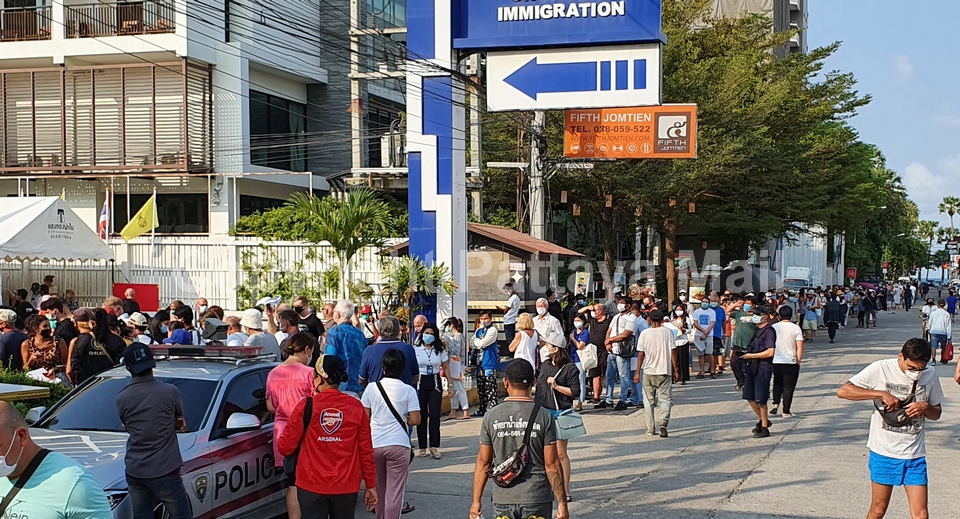
The reported remark of a senior immigration spokesman in Bangkok that the visa amnesty is “unlikely” to be extended beyond the scheduled date at the end of this month is a case of light the blue touch paper and withdraw. Of course, there could be a clarification or even a denial any time. There is so much we don’t know at press time.
Taken at face value, it appears that any short-stay or temporary foreigner will be on overstay and subject to fines if he or she has not sorted out a valid visa or extension of stay by July 31. The categories most likely to be affected are those with an out-of-date 15 days visa on arrival (notably China and India) or border pass (given out at land immigration checkpoints), 30 days visa exemptions (notably tourists from Europe, USA and Australia) and a variety of 60 day tourist and 90 day non-immigrant visas issued by Thai embassies abroad. Non immigrant visas (types “O”, “Ed”, “B” etc.) in particular are complex permissions which commonly require activation by leaving Thailand and returning to activate a double or multiple entry.
To have qualified for the amnesty, the above visas or the extensions of stay associated with them must have expired not earlier than March 26, the starting date in the original visa amnesty statement three months ago. Depending on the specific visa and the number of entries permitted, some affected foreigners will be able to extend their permission fairly easily. But not all. One can only assume at this stage that a foreigner who has benefitted from the amnesty, but has now run out of options for extension, will be entitled to a 7 days’ notice to leave the country on payment of the usual extension fee of 1,900 baht at an immigration office. If that is right, overstay penalties would not come into play before August 7 (a week after July 31).
It is discouraging that the first words from the immigration bureau about the fate of the amnesty should contain a couple of doubtful remarks. It is frankly untrue that Thailand has been uniquely generous in its treatment of stranded foreigners. Thus all Thailand’s neighbors have made a policy decision, including both Cambodia and Malaysia which have agreed that aliens in that position can stay without cost or penalty until “they are able to leave”. Myanmar is still in lockdown with airports and border crossings closed to foreigners. Separately, it is surely untrue that the pandemic worldwide is at last winding down as implied in the reported immigration press statement. The World Health Organization wouldn’t agree.
The strangest omission from the immigration report concerns the land borders. Parts of the immigration system are dependent on some visitors temporarily leaving the country (a border run) and even presenting themselves at Thai embassies (a visa run), typically situated in capital cities abroad, to obtain new permissions to stay in Thailand. These embassies are often very busy, including the one in Vientiane in Laos which, even before the pandemic, became so overcrowded that limited numbers and advance bookings by email were required. But all land and border options are currently impossible as most foreigners can neither visit a neighboring country nor qualify to get back into Thailand.
Short of further clarification being issued within the next few days, it’s best for all foreigners who have expired visas and permissions of stay to visit their local immigration office and present their passport and their dilemma before the end of the month. Some may be allowed to activate a multiple entry visa to Thailand without the need to travel abroad, others may be eligible for a 30 days extension of stay anyway, whilst still others may find they are given a final date to leave, presumably seven days after the amnesty is over.
Whilst many amnesty-foreigners still remaining here will likely now book a flight home rather than risk a very muddy August, an unknown number of thousands will still be here, especially those who cannot yet fly to their home country destination or who crossed into Thailand by land. If the immigration’s answer for the still-stranded ones is to obtain a (very difficult) letter from their (most reluctant) embassy in Thailand highlighting why they cannot yet quit the country, one can only pray for divine intervention. If the Thai government authorities value the future of tourism, they must insist that the visa amnesty arrangements are brought to an orderly and clear conclusion. Not a guillotine chop.




